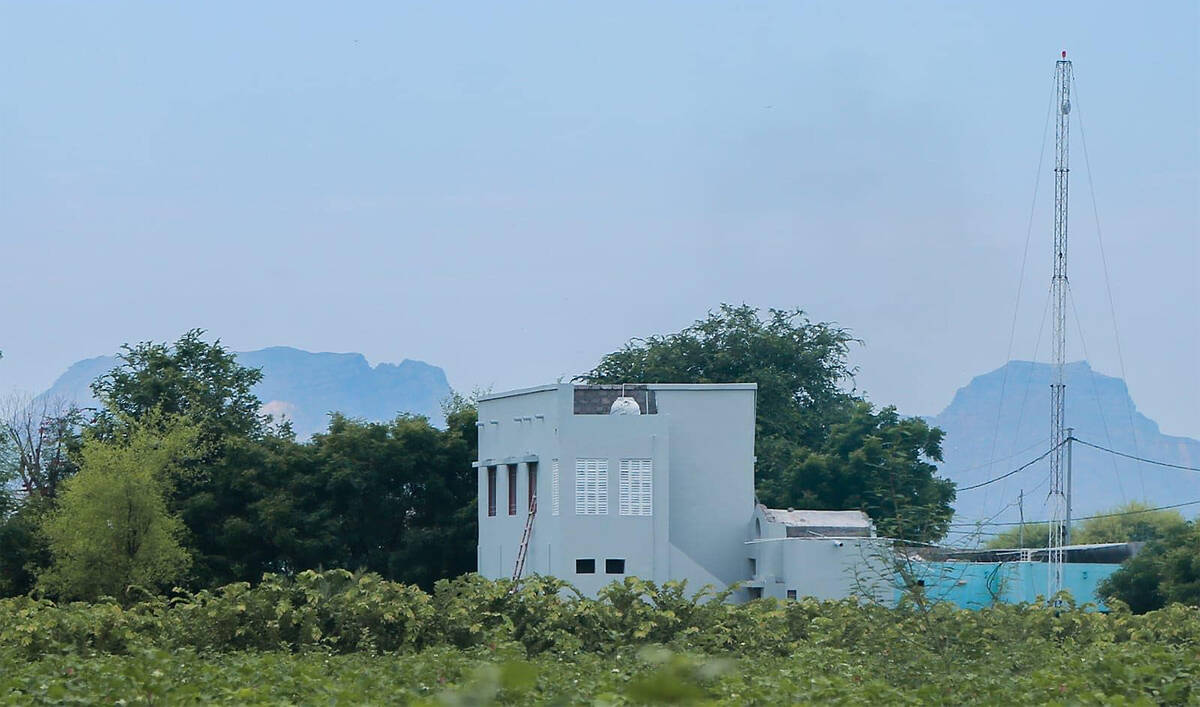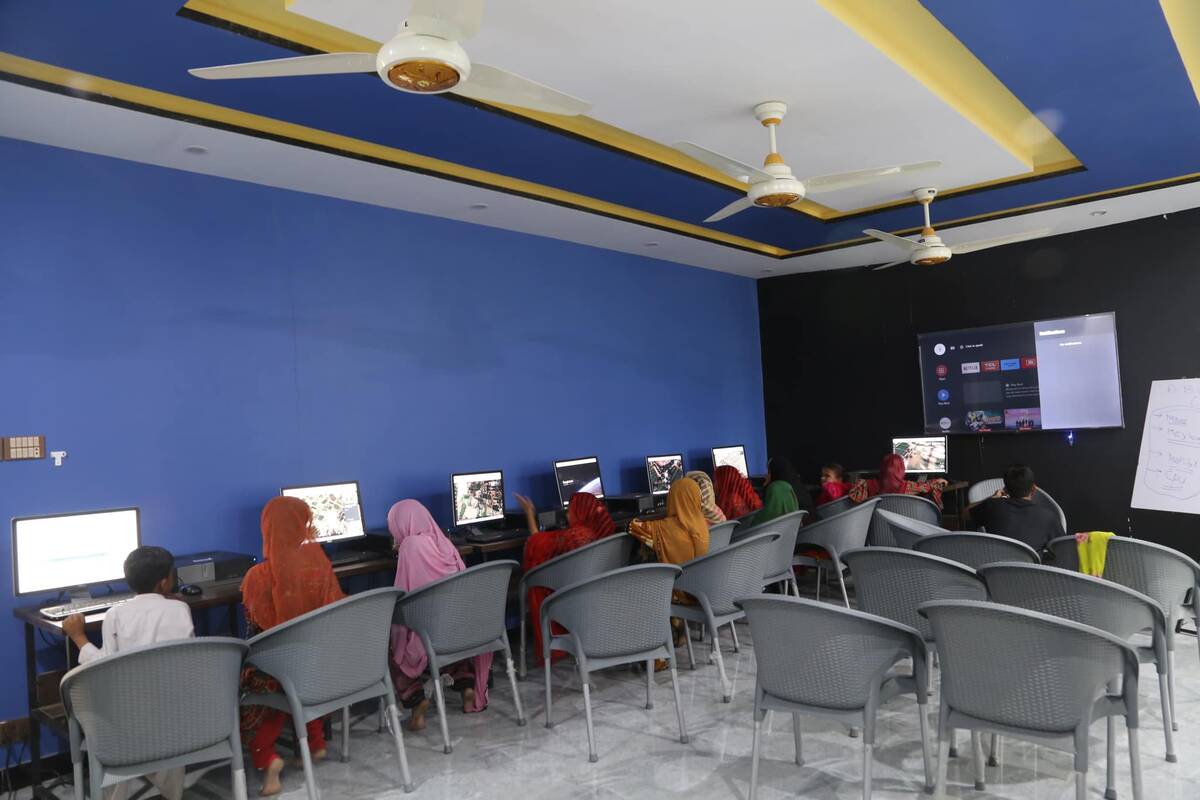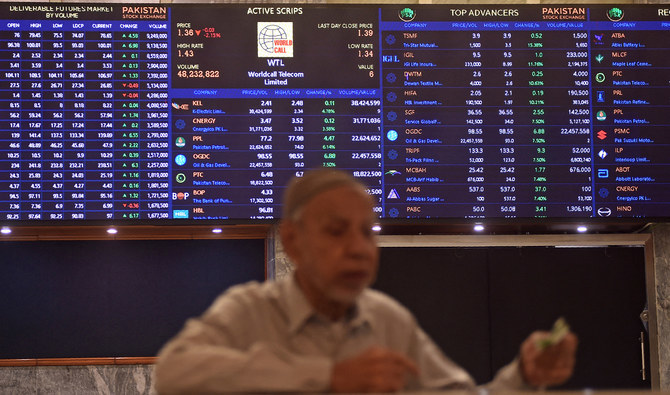KARACHI: Pakistan’s equity market continued to scale record highs with the KSE100 index breaching 60,700 for the first time on Tuesday, making analysts attribute the rally to Caretaker Prime Minister Anwaar-ul-Haq Kakar’s visit to the United Arab Emirates which has kindled hopes for multibillion-dollar investment inflows into the country.
The KSE100 gained over 918 points to close at 60,730 at the end of the trading session, amid ongoing bullish sentiments accompanying the Pakistan PM’s visit to the Gulf region.
During Kakar’s visit, Pakistan and the UAE signed multibillion-dollar memoranda of understanding (MoUs) across diverse sectors, including energy, port operations, waste water treatment, food security, logistics, minerals, and banking and financial services.
“Today’s rally is fueled by the expectations of the multibillion investment flows from the UAE under the SIFC [Special Investment Facilitation Council] initiatives,” Ahsan Mehanti, CEO of Arif Habib Corporation, told Arab News.
The SIFC is a civil-military hybrid forum established in July to fast-track decision-making and promote investment from foreign nations.
Mehanti also pointed to expected inflows of $700 million from the International Monetary Fund (IMF) under a $3 billion short-term financing program, which would help unlock other bilateral financing sources for Pakistan.
He continued that there were expectations of monetary policy ease after the interest rates peaked in recent months.
Analysts have noted that the bullish sentiment at the bourse, which continued to hit record highs, was also fueled by improving macroeconomic indicators.
“Low valuation coupled with foreign buying is supporting this market rally,” Muhammad Sohail, CEO of Topline Securities, commented.
He added that investors were confident that with economic stability in Pakistan, the national currency would also stabilize and interest rates would fall.
“This five-month, 50 percent rally in KSE100 Index is one of the fastest in 20 years,” Sohail continued, noting that the share prices had risen, though the market’s price-to-earnings ratio was still below four times.
Pakistan’s stock market soars past 60,000 points, reaching new high on Gulf investment hopes
https://arab.news/ctcgk
Pakistan’s stock market soars past 60,000 points, reaching new high on Gulf investment hopes

- Analysts say the rally at the market is one of the fastest in 20 years despite a lower price-to-earnings ratio
- The bullish sentiment also owes to the expected inflows of $700 million under the IMF short-term loan
India rejects signing Shanghai Cooperation Organization statement seen as pro-Pakistan

- Indian Defense says statement diluted India’s position on critical issues such as terrorism, regional security
- Singh, without explicitly naming Pakistan, urged the SCO to criticize countries that use “cross-border terrorism“
NEW DELHI, India: Beijing’s bid for enhanced regional leadership suffered a setback Thursday when India rejected signing a joint statement put before members of the China-backed Shanghai Cooperation Organization, saying it was pro-Pakistan in not mentioning April’s terror attack on Indian tourists.
Indian Defense Minister Rajnath Singh said the statement diluted India’s position on critical issues such as terrorism and regional security, a person familiar with the matter told The Associated Press on condition of anonymity because he wasn’t authorized to speak to the media.
India blames Pakistan for backing the gunmen behind the April 22 killing of 26 people, most of them Indian Hindu tourists, in India-controlled Kashmir, and has described it as a terror attack. Islamabad denies the charge.
Singh alleged that the joint statement “suited Pakistan’s narrative” because it did not include that attack but mentioned militant activities in Balochistan, the person said. Pakistan has repeatedly accused India of backing Balochistan freedom movement, allegations that India denies.
The signing ceremony came during a meeting of defense ministers of the Shanghai Cooperation Organization, a regional grouping formed by China and Russia to counter US influence in Asia.
China has largely taken over running the SCO, staging joint drills and holding summits, while Russia is embroiled in its full-scale invasion of Ukraine and international isolation.
While little known globally, the SCO has become one of China’s main instruments to expand its political and economic reach into areas traditionally neutral, such as India, or closely linked to Russia such as Central Asia.
Thursday’s meeting took place in the east China city of Qingdao, home to China’s northern fleet.
Singh, without explicitly naming Pakistan, urged the SCO to criticize countries that use “cross-border terrorism as an instrument of policy and provide shelter to terrorists.” He said members should unite in eliminating terrorism and ensure accountability for those who aid such activities.
“Peace and prosperity cannot co-exist with terrorism and proliferation of weapons of mass destruction in the hands of non-state actors and terror groups. Dealing with these challenges requires decisive action,” said Singh, according to a defense ministry statement.
The April 22 killings embroiled the two nuclear-armed nations in the most serious military confrontation in decades. After days of exchanging fire, they agreed to end all military actions under a US-brokered ceasefire.
On Wednesday, Chinese Defense Minister Dong Jun held one-on-one meetings with his counterparts from Belarus, Iran, Pakistan, Kyrgyzstan and Russia. India, Kazakhstan, Tajikistan and Uzbekistan are also members.
“Unilateralism and protectionism are surging, while hegemonic, high-handed, and bullying acts severely undermine the international order, making these practices the biggest sources of chaos and harm,” Dong said according to the official Xinhua News Agency, in a swipe at the US and its allies.
China and India have decades-old border disputes and Beijing has become one of Pakistan’s closest allies.
Four dead, 19 injured as monsoon rains trigger building collapses, drownings in Punjab

- The provincial disaster agency has urged citizens to take precautionary measures as rains continue
- Authorities in Khyber Pakhtunkhwa have also warned of torrential rains, hailstorms in several districts
ISLAMABAD: At least four people were killed and 19 injured in rain-related incidents across Pakistan’s eastern Punjab province over the past 24 hours, the provincial disaster management authority said on Thursday, as monsoon downpours triggered building collapses and drownings in several districts.
The statement came as authorities in both Punjab and Khyber Pakhtunkhwa warned of continued rainfall through July 1, with Pakistan’s National Disaster Management Authority (NDMA) issuing a glacial lake outburst flood (GLOF) alert for the country’s northern regions a day earlier.
“Two people died when weak, dilapidated structures collapsed in Okara and Bahawalnagar,” the Punjab PDMA said in a statement. “Two others drowned in separate incidents in Jhelum.”
Thirteen houses were also damaged in the province, mostly in rural or structurally vulnerable areas, the statement added.
Punjab’s disaster agency urged citizens to take precautionary measures and said financial compensation for the victims’ families would be provided under government policy.
Separately, the PDMA in Khyber Pakhtunkhwa warned of torrential rains and hailstorms in several districts from Thursday evening through July 1, with a risk of glacier bursts in the north.
It issued alerts to local administrations in Chitral, Swat, Upper and Lower Dir and Kohistan to initiate preemptive measures and inform nearby communities.
Pakistan is among the countries most vulnerable to climate change, with a history of extreme weather events linked to erratic monsoon patterns, glacial melt and heatwaves.
In 2022, record floods killed over 1,700 people and caused more than $30 billion in damages.
On Wednesday, the NDMA said continued high temperatures and intense monsoon activity were putting stress on glacial lakes in Pakistan’s mountainous north, raising the risk of flash floods.
Valleys in Chitral and Ghizer are among the most vulnerable, with warnings issued to avoid travel near glaciers and riverbanks.
Iran expressed rare gratitude to Pakistan amid recent Israel war — PM Sharif

- Shehbaz Sharif acknowledges Crown Prince Mohammed bin Salman's ‘significant role’ in defusing tensions
- He also highlights Field Marshal Asim Munir’s lengthy meetings with the top American and Iranian officials
ISLAMABAD: Prime Minister Shehbaz Sharif on Thursday expressed satisfaction over the ceasefire that brought an end to the recent Israel-Iran conflict, saying Tehran had thanked Pakistan’s political and military leadership for playing a constructive role during the war after Field Marshal Asim Munir’s meetings with both American and Iranian officials.
The 12-day war began after Israel carried out airstrikes on Iranian nuclear facilities, killing several senior military commanders and scientists, while officials in Tehran were engaged in nuclear negotiations with the United States.
Shortly before the ceasefire was announced, US forces struck three Iranian nuclear sites and claimed to have set back Iran’s nuclear program by years.
“For the first time in history — and I am not just talking about the war itself, but on several fronts — Iran openly thanked Pakistan’s political and military leadership in a way that, in my view, has no precedent in recent times,” Sharif told the federal cabinet.
“Our Field Marshal had a luncheon meeting in Washington with President [Donald] Trump,” he continued. “Then in Istanbul, the army chief had a one-and-a-half-hour meeting with [Iranian Foreign Minister] Abbas Araghchi.
During that meeting, he specified Pakistan’s efforts. In response, he [Araghchi] said … ‘We [Iranians] were not the ones who attacked… If Israel stops, then we are ready for dialogue.’”
The prime minister said Pakistan also condemned the missile attacks on US bases in Qatar and had conveyed its position clearly to all sides.
He described Iran’s posture during the war as one of “dignity and restraint,” praising the Iranian people for refusing to capitulate under pressure.
Sharif said Saudi Crown Prince Mohammed bin Salman also played a significant role in defusing tensions.
“I had a phone conversation with the Crown Prince,” he said. “We spoke in great detail. And I say this to you with full sincerity: he played a significant role in helping to stop this war.”
“As soon as Israel launched its attack, Saudi Arabia issued a strong statement of condemnation,” he added. “After that, the Crown Prince personally spoke to the President of Iran [Masoud Pezeshkian].”
As the ceasefire continues to hold between the two Middle Eastern rivals, President Trump has said American and Iranian officials could engage in talks next week, though Tehran has not confirmed any such plans.
Trump, speaking at a NATO summit, said he was not keen to resume formal negotiations but declared the war was over and insisted Iran would not be allowed to acquire a nuclear weapon.
Iran’s parliament, meanwhile, voted to fast-track legislation suspending cooperation with the International Atomic Energy Agency, following US strikes on its nuclear facilities.
With input from AP
Pakistan decries use of torture in Palestine, Kashmir on UN anti-torture day

- Rights groups have long reported widespread abuse in both areas, including arbitrary detentions
- Pakistan calls for strong oversight mechanisms to prevent torture and promote accountability
ISLAMABAD: Pakistan on Thursday expressed grave concern over the use of torture as a tool of repression in the Occupied Palestinian Territory and Indian-administered Kashmir, accusing the “occupying powers” of systematically inflicting abuse to suppress demands for self-determination.
The statement came on the International Day in Support of Victims of Torture, marked each year on June 26 to promote the eradication of torture and support survivors. The UN General Assembly designated the day in 1997, coinciding with the anniversary of the 1987 entry into force of the UN Convention Against Torture.
Human rights groups have long reported widespread abuse in both Palestine and Kashmir, including arbitrary detentions, custodial beatings and torture, particularly of young men and boys.
“The people of the Occupied Palestinian Territory and Indian Illegally Occupied Jammu and Kashmir (IIOJK) continue to be subjected to the worst forms of torture and other cruel, inhuman, or degrading treatment or punishment by the occupying powers to suppress their right to self-determination,” the foreign office said in a statement.
Reaffirming its commitment to human dignity and justice, Pakistan said it was strengthening legal reforms, institutional safeguards and oversight mechanisms to prevent torture and promote accountability.
It also underscored its provision of medical, legal, and psycho-social support to victims.
Citing the values of justice and compassion in religious teachings, the foreign ministry said any act of torture was incompatible with Islam and international law.
Pakistan called on the international community to condemn what it described as systematic crimes by occupying forces and to take steps to hold them accountable.
Balochistan youth swap trees for tech as Internet lab bridges digital divide

- Rural innovation lab offers free Internet and digital skills to youth in underserved Bela district
- Balochistan remains Pakistan’s least connected province despite its size and mineral wealth
LASBELA, Pakistan: When Abrar Roonjha returned to his hometown near Bela in Pakistan’s southwestern Balochistan province during the COVID-19 lockdown, he was faced with a major dilemma: how would he attend online classes without reliable Internet connectivity.
Balochistan, Pakistan’s largest province by area, accounts for nearly 44% of the country’s landmass but only around 6% of its population. Despite its mineral wealth and geostrategic location, the militancy-plagued region remains the country’s most underserved in infrastructure and connectivity.
Combine that with the COVID-19 pandemic, which had a devastating impact on education across Pakistan, with prolonged school closures affecting more than 40 million students nationwide. According to a 2021 UNICEF report, around 23 million school-going children were unable to access remote learning during the pandemic due to limited or no Internet connectivity and a lack of digital devices.
The situation was especially dire in rural and underserved areas like Balochistan, where infrastructure gaps meant many students were entirely cut off from their lessons.
“I used to hang my mobile phone on a tree and try to connect to its hotspot to continue my studies but it was very difficult,” Roonjha, now 21, told Arab News.

That changed in 2021 with the launch of the Wang Lab of Innovation (WALI), a free Internet and digital skills center in Roonjha’s village, supported by the Internet Society and run by the Welfare Association for New Generation (WANG), a grassroots organization in Lasbela district.
Since then, nearly 650 youth in the region, many from low-income families, have gained access to high-speed Internet and basic tech education.
For young people like Roonjha, the lab has become a portal to the wider world.
“When the Wang Lab of Innovation was established here, I was able to access high-speed Internet. This brought a major positive change in my life,” said Roonjha, who now leads creative programs at the lab.
The connectivity also enabled him to attend international forums, including the World Youth Festival in Russia in 2024 and a UN regional conference on sustainable development in Bangkok earlier this year.
DIGITAL DIVIDE IN PAKISTAN’S LARGEST PROVINCE
Despite its vast size, Balochistan remains Pakistan’s least connected province when it comes to Internet access.
According to Freedom House, around 60 percent of the region lacks any Internet coverage, and in areas with service, mobile speeds are often well below the national average of 6.2 Mbps. The Pakistan Telecommunication Authority reports broadband penetration in the province sits at just 15 percent, compared with the national average of 45.7 percent.
Infrastructure challenges, like mountainous terrain, sparse population, and frequent security-related shutdowns, have consistently deterred investment in fiber and mobile networks . While government-backed initiatives like the Universal Service Fund have begun extending 4G and broadband over limited areas of Balochistan, the majority of rural communities still struggle to connect, reinforcing the importance of local projects like the WALI lab.
“WALI has created a vital space, especially for girls, to access knowledge and skills they would otherwise have no means to acquire,” said Aftab Ahmed, 26, a co-founder of the lab.

The initiative is also one of the few local digital literacy efforts led by young people from the region. While national programs like Pakistan’s “Digital Pakistan” campaign have focused on major urban centers, grassroots projects in remote provinces are rare and often underfunded.
The lab is housed in a modest building in the village and is now a daily destination for schoolchildren, university students, and aspiring content creators. Its impact is visible in the confidence and creativity of its youngest users.
Fawaz Qadir, 16, began coming to the lab a year ago.
“I would come here and learn about different AI tools,” he said, describing how he creates music and short films using Suno AI and Meta’s animation tools.
“I talk about climate change and how humans have damaged our environment.”
Abdul Hadi, 14, walks two kilometers each day to reach the lab. In just a year, he’s learned to design YouTube banners and navigate the Internet.
“Things are no longer the way they used to be,” he said.
For Rifat Wasim, 13, a student at the local girls’ school, the lab is her only access to a computer.
“There’s no laptop or such devices at my home, so I come to the lab, and I enjoy it,” she said. “I’ve learned to browse the Internet, use a computer, and create videos.”
RETHINKING THE FUTURE
Roonjha, the sociology student who once studied under a tree, now teaches children to use artificial intelligence tools.
“I see that children as young as ten or twelve are creating music using AI, they are making films,” he said.
“They’ve started to understand the possibilities the Internet offers, and how, through AI, they can showcase their work to the world and make their presence felt.”
The WANG initiative remains one of few rural digital labs in the province. Other recent government-supported efforts include the USF, which has launched projects to expand 4G coverage in parts of Balochistan. But for many villages in districts like Lasbela, such access remains a distant promise.
Ahmed, the WALI co-founder, hopes the model can be replicated.
“Digital inclusion is not just about connectivity, it’s about opportunity,” he said.
“When children in remote areas have access to the same tools as anyone else, it transforms how they see their future.”










